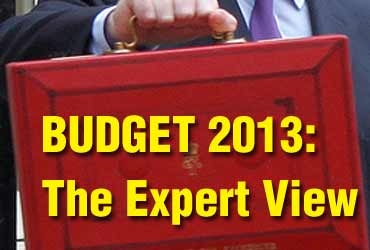"While George Osborne gave a far more confident and polished performance at the despatch box yesterday, it could not disguise a rather drab selection of policies with the prospect of another year's hard grind in the deficit reduction to look forward to.
Obviously beer drinking geriatric Equitable Life policyholders might have something unexpected to celebrate, but otherwise even the attractive policies were all a bit more 'jam tomorrow' and of course one always has to wait to read the Red Book to find out the real detail (and see the possible sting in the tail). However, while having little to give away, the Chancellor has likely managed to produce measures to aid business and jobs as well as something for middle England to at least look forward to next year and the year after.
Business in general can but applaud another cut in corporation tax to 20 per cent in April 2015 and one must suppose the rationale here is that the lower the rate the more likely companies are to just pay and not waste management resources finding legal ways to circumvent paying as there is a ground swell of opinion here opposing companies' methods of legitimate tax planning.
Many of the measures had a political edge and were astutely crafted in stark contrast to last year's pasty tax – the raising of the personal allowance before income is taxed to £10,000 for instance was greeted by rapturous applause on the Lib-Dem benches and will perhaps mend some fences in the coalition. But of course there was a sting for some as not indexing the levels at which tax bands change mean over three million people will be dragged up into higher rate tax in 2014/15 though most of these will not feel especially well off! Of course there was the promise of financial help to come - being phased in by the Autumn of 2015 – to help working families cope with the costs of childcare.
Some might not like the more populist measures that he espoused – the 1p cut in duty on a pint of beer for example and abolition of its annual duty escalator - but the cancelling of the September rise in fuel duty would be welcome too. But in the eyes of many economists this morning it would seem the aid for housing in general and first time buyers in particular has not been greeted by the chorus of approval the Chancellor might have expected given that it has all been agreed prior to the Budget and in total is over £5bn of aid.
{desktop}{/desktop}{mobile}{/mobile}
Critics of this measure are wondering out loud why the Government is so keen to possibly inflate another housing bubble with guaranteed loans for buyers which could support up to £130bn of high loan to value mortgages. The idea no doubt is that a revived housing market will create domestic consumption even if based on increased credit – but many commentators wonder if we have learned nothing at all from the last five years credit 'accident' and cite the dangers of another housing credit bubble, though I am sure the Treasury has thought about this aspect.
There have been other tweaks to measures for savers such as the removal of stamp duty on AIM shares which is hoped will revive interest in that market and rather more arcane measures dealing with stamp duty in unit trusts – but no abolition of the hated stamp duty on equity market trades!
All these measures have to be paid for of course and there is another round of squeezing on most Government departments as well as a little noted move on pensions. The new single tier pension will be introduced a year earlier than previously forecast abolishing the second state pension and ending contracting out - so the Chancellor has a potential £6bn windfall from this simple move. At the same time he introduced the £72,000 lifetime limit on the amount pensioners have to contribute to care costs also starting in 2016.
The hopes for increasing growth seems to be laid squarely on the shoulders of the Old Lady of Threadneedle Street. Given the slender change to previous fiscal policy and the fact we are still forced to wear the fiscal hair shirt of fighting the country's indebted status – something the Chancellor admitted has wandered from its previously assumed timeline – reform of monetary policy was expected and duly delivered.
However, given the big billing the markets have had with respect to the new Governor Carney and his arrival in July, markets were underwhelmed by what the Chancellor and both the old and incoming Governors at the Bank seem to have agreed upon. The two per cent CPI inflation target remains firmly anchored for the MPC although the way has been paved to the MPC to follow the Fed style of guidance on monetary policy moves.
Of course the worst news was got out of the way early on when the Chancellor reported on the OBR forecast changes and growth. The OBR now expects a growth rate this year of just 0.6 per cent compared to its forecast in December last year of 1.2 per cent although the medium term forecasts have been less heavily impacted (yet).
All in all, it was an unremarkable budget in terms of headline making but nonetheless a pretty reasonable budget in the circumstances and markets have taken it in their stride with little reaction yesterday afternoon. It leaves little for investors to do in its immediate aftermath apart from in the Chancellor's eyes: keep taking the austerity medicine."
Justin Urquhart Stewart, Seven Investment Management
• Want to receive a free weekly summary of the best news stories from our website? Just go to home page and submit your name and email address. If you are already logged in you will need to log out to see the e-newsletter sign up. You can then log in again.

